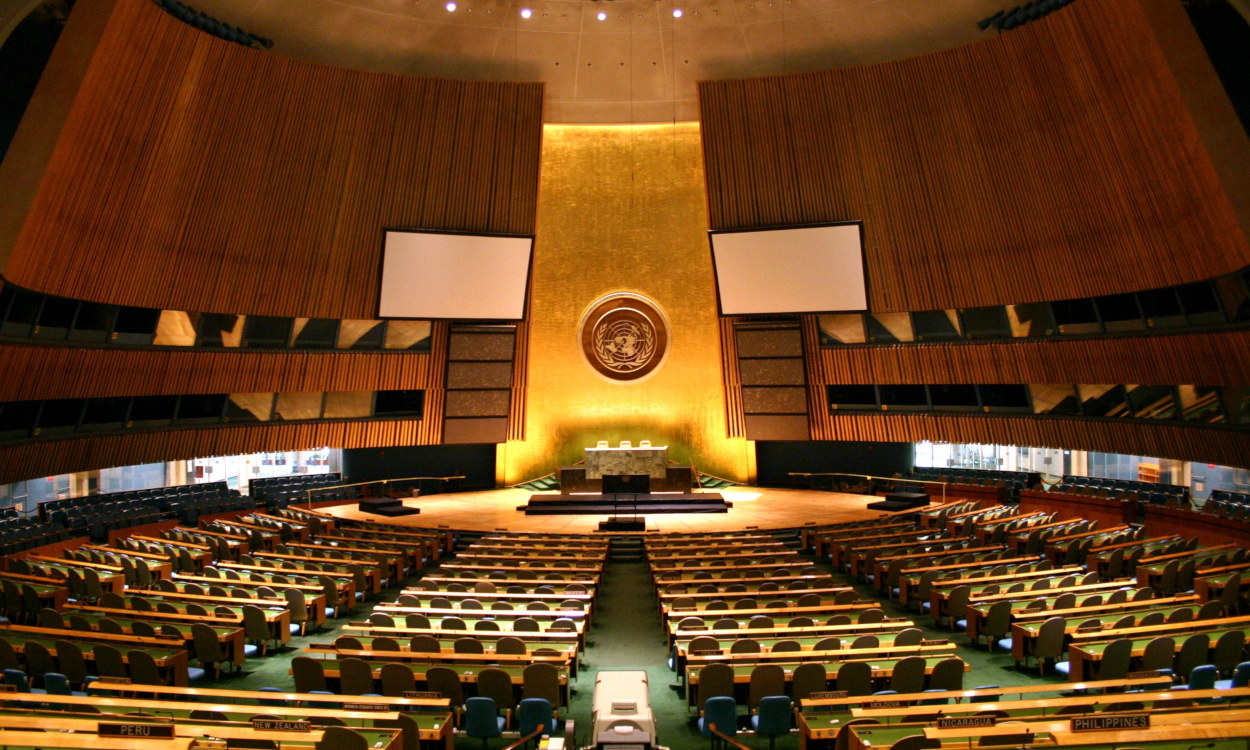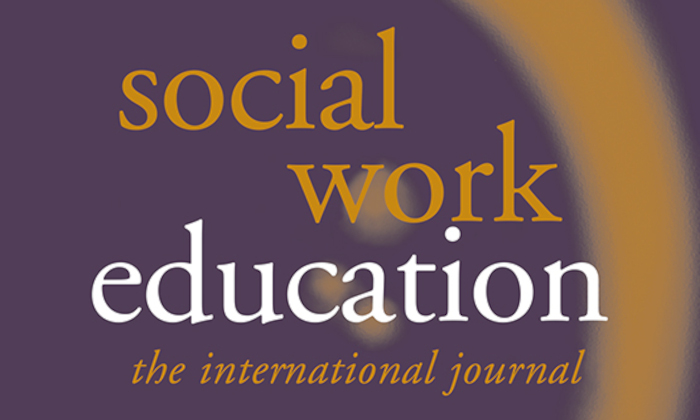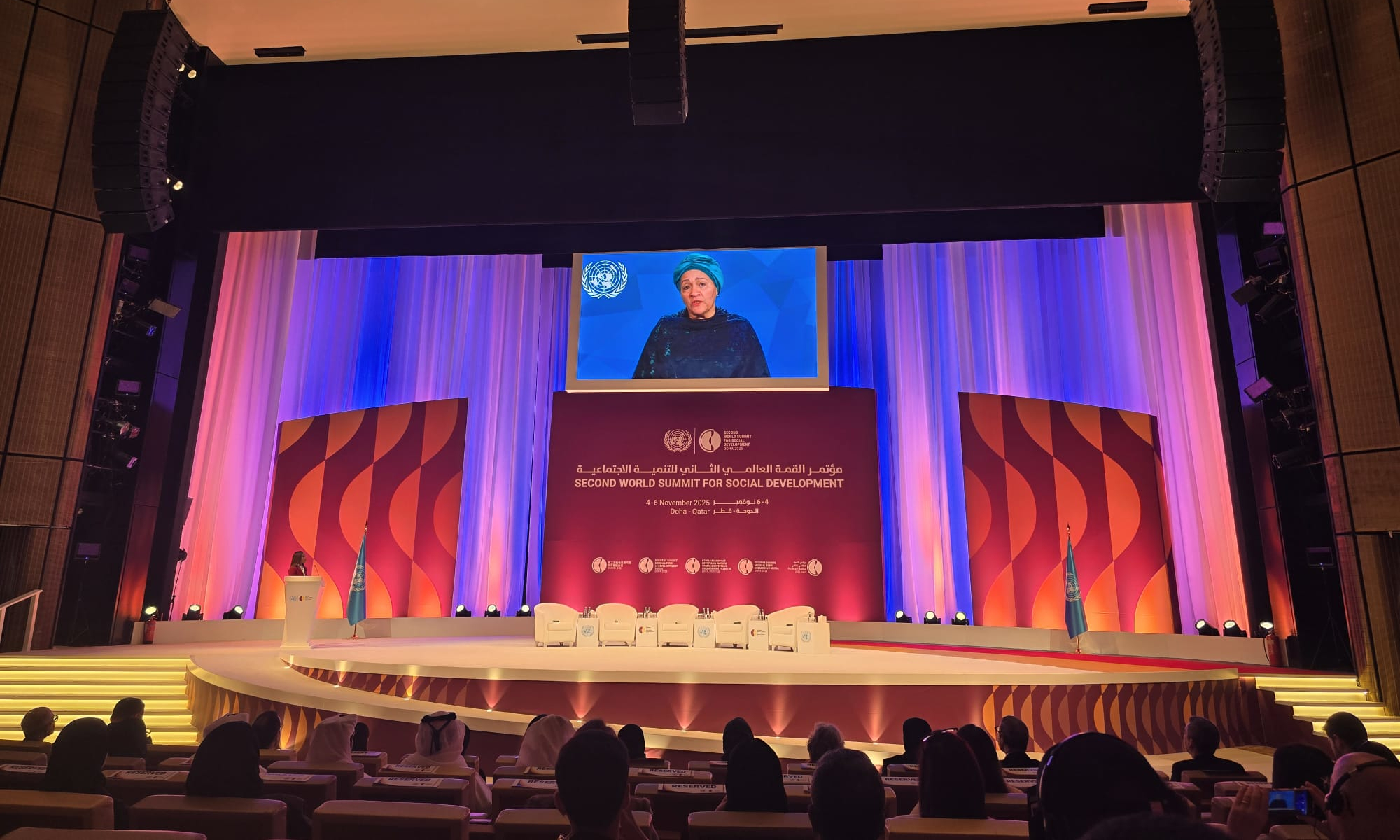Strengthening the institutional structures for sustainable development: role of social protection
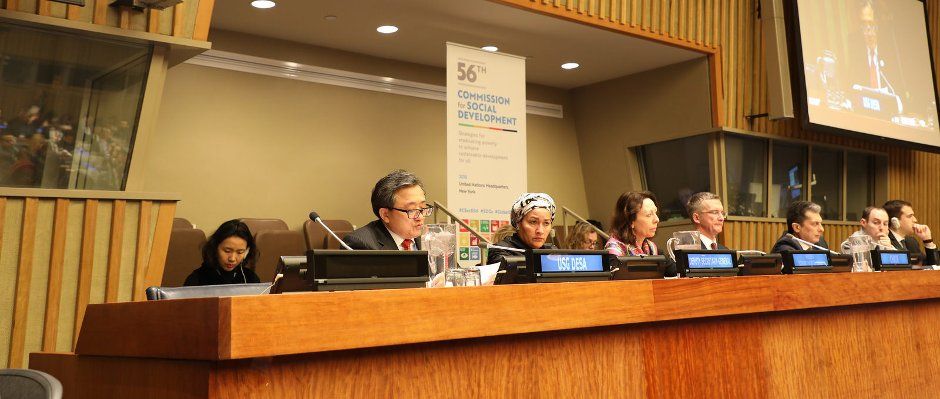

A side–event on the occasion of the 56th session of the Commission for Social Development (CSocD) was organized by the ICSW on 2 February 2018 at United Nations Headquarters in collaboration with the International Association of Schools of Social Work, the ILO, and the EU-SPS Project, Finland. Conceived as an international seminar to address major policy issues of concern to the ICSW and its partners, with the purpose of gaining a deeper understanding of the interrelationships among the various factors of Agenda 2030, the side-event brought together scholars and practitioners interested in exploring the nexus between social protection and sustainable development. The target audience was national representatives from UN member states, as well as other stakeholders attending the Commission, including ICSW partners from the Global Coalition for Social Protection Floors.
Providing guideposts for a discussion, a concept note prepared by the organizers indicated that a transformative development framework requires substantial changes at the normative and institutional levels, underpinning the common aspiration for a sustainable future. Social protection systems and measures for all, including floors, have been widely recognized not only as a vital tool in the fight against poverty and inequality, but also as an important mechanism for creating synergies among the social, economic and environmental dimensions of development. As a holistic framework, social protection grounded in universalism facilitates the quest for the most effective enablers of sustainable development, reducing vulnerability, strengthening resilience and promoting empowerment.
In this light the presenters focused on some conceptual issues, as well as practical solutions, pertinent to the work of the 56th session of the Commission for Social Development. Some of the specific issues chosen for discussion and put before the speakers were as follows: Should social protection be considered a new international social norm? What approaches are best in making social and environmental policies mutually supportive? What role can social protection play in changing mindsets, principles and rules so as to put sustainable development at the core? Lessons learned and obstacles encountered in building sustainable capacities for social protection at the national and regional levels was also one of the key threads.
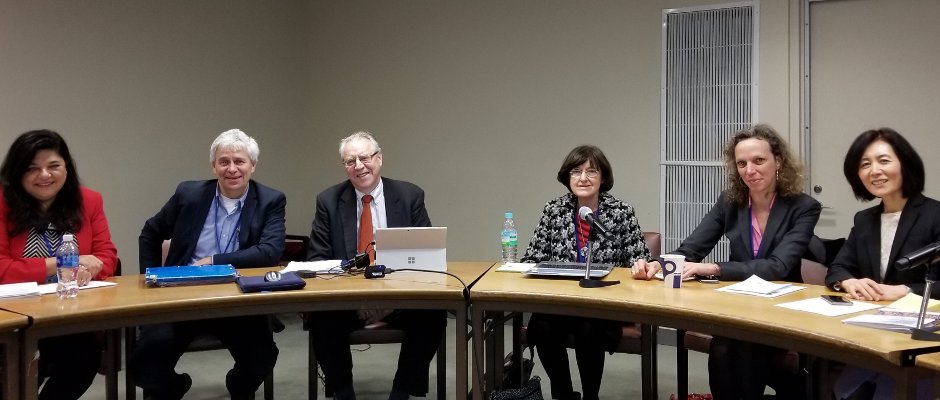
Opening the discussion, Valerie Schmitt, Deputy Director, ILO Social Protection Department, touched in her presentation upon all three dimensions of sustainability—social, economic and environmental. In social terms, building social protection systems, including floors, proved to be a crucial ingredient for poverty reduction and social inclusion. In economic terms, social protection raises productivity by facilitating access to health care and education; it helps to maintain disposable income and demand at a certain level in times of crisis, and it reduces inequalities and enhances political stability. In environmental terms, building such systems facilitates “just transition”, making green policies more socially acceptable. Several factors increase the sustainability of social protection systems and floors, namely a participatory design process, rights-based legal frameworks, innovative and sustainable financing, as well as transparent and efficient delivery mechanisms. Referring to data contained in the just released ILO flagship publication, World Social Protection Report, the speaker underscored that only 29 percent of the world population has access to comprehensive social protection, and 45 percent are covered by at least one benefit; however, 55 percent (4 billion people) have no social protection. A change in mindsets is required in order to fulfill the promise of the 2030 Agenda, namely to leave no one behind. The success of the global campaign to promote universal social protection depends on the joint efforts of multiple stakeholders—workers and employers, policy makers, corporations, philanthropists, and the public at large.
Representing the European Union Social Protection Systems Initiative (EU-SPS), launched three years ago, Dr. Timo Voipio (Finland) described some results of a 4-year programme supporting national, regional and international expert institutions in 11 mainly low-income countries in their efforts to develop inclusive and sustainable social protection (SP) systems.
The initiative aims at supporting the systematization of national SP efforts, enabling key governmental stakeholders to mobilize, develop and make use of national and regional expert institutions, thus increasing national expert resources and strengthening the partner countries’ domestic analytical and management capacities in social protection. The partner countries are Cambodia, Ethiopia, Indonesia, Kyrgyzstan, Malawi, Mozambique, Namibia, Tanzania, Togo, Vietnam and Zambia. Country ownership and participation are the core principles for the EU-SPS’s work. While it is an ongoing project, some preliminary results have been very positive in exploring options for extending social protection schemes at the national level, strengthening SP-relevant education and research capacity, providing technical assessments and facilitating use of other tools essential for building sustainable capacities. The initiative also supports peer-to peer learning across countries through regional organizations.
In her presentation, Prof. Lynne Healy, the main representative of the IASSW to the United Nations, highlighted the challenging issues in the design of social protection systems so as to ensure that “no one is left behind.” Social protection plays a critical role in reducing poverty and inequality, but the groups that are farthest behind are also the most difficult to cover. The first of them is informal workers, including care workers; in some countries, more than 50 percent of workers are in the informal sector. Migrants pose a special challenge for governments and the international community and ensuring coverage will require considerable negotiation. In the future, social protection in a world with limited work, including adults with no work history, will require innovative thinking and the redesign of social roles and protections.
Underscoring the links between social protection and sustainable development, Prof. Sergei Zelenev, Executive Director of the ICSW, emphasized that sustainable development is impossible without tackling extreme poverty in a comprehensive and consistent way. The ICSW is keen to join forces with academics, professionals and policy-makers to identify obstacles, explore new opportunities and come up with new policy recommendations in the social field, linking these steps with efforts to promote sustainable development. The adoption of the 2030 Agenda provides a window of opportunity for the proponents of social protection systems, including the ICSW, to advocate and push for the reinforcement of social protection policies in the context of sustainable development. We see a lot of positive momentum towards the support of social protection, including political support, which was so visible during the deliberations at the CSocD, but a lot more needs to be done to get recognition of social protection as a new international social norm. Together with partners the ICSW continues advocating for a dedicated ECOSOC resolution on social protection systems, including floors, seeing it as an important political step towards universal and comprehensive social protection for all.
The presentation of Prof. Shirley Gatenio Gabel, Fordham University and the IASSW USA, was devoted to a discussion of theoretical aspects of welfare provision, particularly universal and targeted approaches. In her view, today’s societies are characterized by an attack by neoliberalism on welfare states. While neoliberalism is often presented as a natural, reasonable way of promoting democracy and economic expansion around the world, its ultimate purpose promotes corporate domination and upward distribution of wealth and power.
In the 1960s, Richard Titmuss popularized the concepts of universalism and targeting with the intention of capturing the nature of the arguments around the welfare policies adopted by Britain in the post war period. Universalism was seen as a compromise between the two major perspectives of the period - socialism and liberalism. In more recent decades, social programs have arisen that may be categorized as both universal and selective. We often label social insurance programs – public retirement pensions, health coverage, unemployment benefits, some child-benefit programs, maternity and parental leave benefits – as universal, when in fact they tend to cover employees in the formal workforce and omit those who work in the informal sector.
The ambiguity of the term "universalism" makes it vulnerable to neoliberal attacks. Universal programs may sound progressive, but this may mask a program’s limited coverage to only formal laborers and other protected groups. Seventy-one percent or 5.2 billion people are not, or only partially, protected, and many of these unprotected are informal economy workers. We need new approaches that are rights-based rather than earned, and are holistic and sustainable and allow for the voice of beneficiaries and localities to be heard in policy deliberations; they should also make clear the responsibilities of the various levels of government and opportunities for redress. Current concepts have guided us this far, but it is now time to create new concepts to guide us into the future we want.
The discussion was moderated by Ms Wenyan Yang, Chief, Social Perspective on Development Branch, UN/DESA.

